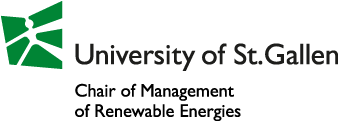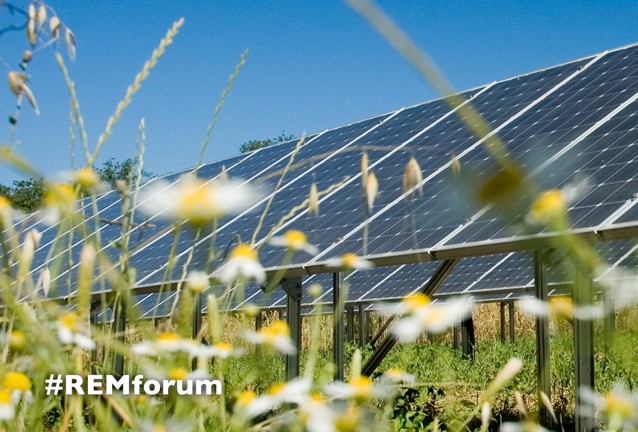Programme 2020
System Change, not Climate Change? Towards a re-NEW-able Normal
Thursday, April 2, 2020
Pre-Conference Webinar (on-line)
Business Model Innovation in Energy - the Confluence of Locality, Digitization and Sector Couplin
Horizon2020 Project: E-Land
- Heidi Tuiskula Smart Innovation Norway, NO (workshop leader)
- Prof. Dr. Moritz Loock University of St.Gallen, CH (workshop leader)
- Elizabeth Côté University of St.Gallen, CH
- Dr. Dorin Let, Valahia University of Târgoviște, RO
- Kristi Marie Lund, Sales Specifier Engineer, Schneider Electric, NO
- Thomas N. Mikkelsen, Co-Founder & CEO, GECO Global, DK
- Bonnie Murphy, Behavioural Scientist, GECO Global, FI
- Sanket Puranik Senior Researcher, Smart Innovation Norway, NO
Participants: E-LAND members, SIG, Bridge projects
=> Link to Video and updated Programme: https://elandh2020.eu/event/workshop-business-model-innovation-in-energy-the-confluence-of-locality-digitization-and-sector-coupling/
This pre-conference webinar was hosted by the E-LAND project (https://elandh2020.eu) and its stakeholder innovation group. The E-LAND project is an international project that develops a toolbox for energy related business model innovation. By focusing on local energy islands E-LAND links the potential of digitalization to the coupling of different energy sectors. The meeting has a specific focus on universities as energy islands. The potential to develop a carbon neutral campus will be illuminated. The insights provide important information for a broad range of properties and managers of green campuses (e.g. universities, universities of applied sciences, commercial real estate, or industrial parks), energy professionals, investors, and scholars. The meeting also has a specific focus on community engagement and business model innovation. Two views from E-LAND and similar international research and innovation projects are presented. the goal is to discuss and build up collaborations to improve community engagement and business model innovation also for one's own energy innovation projects.
lessThursday, September 10, 2020
DINNER SPEECH (ON-LINE)
=> VIDEO: youtu.be/5oTB4RMSrsE
A green, healthy and just economic Recovery
- Sandrine Dixson-Declève, President, Club of Rome
Moderator: Beatrice Petrovich research associate, Chair for Management of Renewable Energies, University of St.Gallen
Friday, September 11, 2020
=> LINK to Conference Video:https://youtu.be/XHdDYmwy1ZU
Moderator: Arthur Honegger
09:00 Introduction to the Conference Theme
System Change, not Climate Change? The re-new-able Normal
Prof. Dr. Rolf Wüstenhagen Chair for Management of Renewable Energies, University of St.Gallen
09:10 Keynote (on-line)
Limiting Warming to 1.5°C - without the magic Bullet
- Charlie Wilson PhD, University of East Anglia, Norwich Research Park, Reader in Energy & Climate Change, Tyndall Centre for Climate Change Research, UK
09:30 Panel Discussion I.
Doing Business in a post-pandemic 1.5°C World
- Mag. Cornelia Daniel Solar Entrepreneur, AT (*)
- Ismea Guidotti Climate Strike Switzerland, CH
- Prof. Dr. André Reichel International Management & Sustainability, International School of Management ISM, DE
- Jochen Wermuth Investment Committee SWF KENFO und Green Growth Funds, DE (*)
Moderator: Arthur Honegger (SRF)
10:15 Coffee Break
10:30 Panel Discussion II.
Unlocking Rooftop PV Investment: a Climate Bonus on Mortgages?
- Christoph Baumann State Secretariat for International Finance SIG, CH
- Prof. Dr. Charles Donovan Imperial College Business School London, UK (*)
- Jörg Gasser CEO, Swiss Bankers Association (SBA), CH
- Dr. Merla Kubli University of St. Gallen, CH
- Kathrin Wehrli Head Dept. Products & Investment Services, Raiffeisen Schweiz, CH
11:30 Coffee Break
11:45 Panel Discussion III.
Digital Energy after COVID-19
- Dr. Matthias Galus Head Digital Innovation office, Swiss Federal Office of Energy, CH
- Prof. Dr. Siegfried Handschuh Data Science, Institute of Computer Science, University of St.Gallen, CH
- Fabienne Muff Co-founder and CEO, Carbon Removed, CH (*)
- Prof. Dr. Verena Tiefenbeck University of Erlangen-Nürnberg, DE (*)
12:50 CLOSING REMARKS
- Prof. Dr. Rolf Wüstenhagen Chair for Management of Renewable Energies, University of St.Gallen
13.00 End of online Meeting
(*) Speaker takes part online
WORKSHOPS changend to WEBINARS
Webinar 1 - The Role of Product Bundling to electrify post-COVID-19 urban Transport
September 25, 2020 - 11:00-12:00 CEST (CLOSED)
=> Link to Video:https://www.youtube.com/watch?v=y_zBXnupsGw
- Jana Plananska & Nathalie Dällenbach University of St.Gallen (workshop leaders)
- Judith Häberli Co-founder & CEO, Urban Connect, CH
- Stefan Büsser Product Manager E-Mobility, Repower, CH
The COVID-19 pandemic and the corresponding measures have significantly influenced societies as a whole, urban transportation in particular. While the use of public transport has decreased to a fraction of the pre-pandemic levels, private mobility and active transport modes such as cycling have increased in popularity. In order for these trends not to further exacerbate the existing challenges of urban transportation, namely high congestion and pollution, the new normal has to be based on low carbon solutions. Electric vehicles (EVs) represent the most promising technology to decarbonize transport. Their adoption is slowly increasing yet is still far behind the global and Swiss national targets. To promote electric mobility in Swiss cities, innovative strategies are necessary. Product bundling has been shown to be an effective marketing strategy to reduce complexity and motivate pro-environmental behavior in other sectors, such as food and energy. How successful can bundling be to accelerate adoption of electric mobility and thus help make urban transport systems more sustainable in the new post-COVID-19-normal? This is the main question to be answered in the workshop. After a brief introduction of the concept and the impact of COVID-19 on urban transport, two initiatives employing bundling to promote electric mobility in Switzerland will be introduced. A moderated Q&A session will follow, during which participants will have a chance to raise questions and interact with the experts.
lessWebinar 2 - Community Investment & Social Acceptance
October 2, 2020 - 11:00-12:00 CEST (CLOSED)
in collaboration with MISTRAL
=> Link to Video: https://www.youtube.com/watch?v=ti84sKa_bGs
- Elizabeth Côté University of St.Gallen (workshop leader)
- Josef Baur Founder & managing director, eueco GmbH, DE
- Jakob Knauf Research Associate, University of St.Gallen, CH
Financial participation of local citizens in renewable energy projects has emerged as a promising option to increase social acceptance. As a result, industry actors and policymakers are looking for ways to incentivize financial participation. However, the success of those measures remains unclear. This webinar aims to investigate the challenges associated with financial participation and related incentives to derive best practice guidelines for developers and policymakers. The interactive session will draw on the German experience, addressing many questions such as: What is the role of citizens in the German energy transition following recent changes to community investment rules? What could be the way forward in dealing with these challenges?
lessWebinar 3 - Harnessing positive Emotions for Wind Power
October 9, 2020 - 11:00-12:00 CEST (CLOSED)
in collaboration with MISTRAL
=> sorry, no video available
- Julia Cousse & Nina Schneider University of St.Gallen (workshop leaders)
- Cédric Aubert Managing Director, geoProRegio AG
- Cyril Ducatez Research Analyst, ewz
Intense debates around the siting of wind turbines or the #FridaysForFuture movement have highlighted that energy projects and climate policies can trigger strong emotions, positive or negative. While these emotions can be an obstacle to implementing clean energy policies, they can also be a positive driver. People prefer hearing about solutions rather than problems. Highlighting the positive sides of clean energy, such as wind energy, may elicit positive emotions that may, in turn, facilitate acceptance. In order to move from insight to impact, this workshop consists of three parts: (1) we will discuss why emotions matter and the types of emotions existing among the Swiss population regarding wind energy, (2) renewable energy professionals will share their insights into stakeholders’ efforts to address emotions and specifically, spread positive ones, and (3) participants will be invited to ask questions and join the debate on the topic.
lessWebinar 4 - Alpine Solar Power (auf Deutsch)
October 16, 2020 - 11:00-12:00 CEST
- Alexander Stauch & Pascal Vuichard University of St.Gallen (workshop leaders)
- Bertram Fleck former District Chief Executive Rhine-Hunsrück, DE
- Guillaume Fuchs Project Manager Floating PV, Romande Energie, CH
The demand for renewable energy in the winter half-year will increase significantly in the foreseeable future, as a result of nuclear power plants being shut down and the trend towards electrification of buildings and transport. Increasing the capacity of seasonal storage (hydropower), as well as an expansion of wind energy, which generates more electricity during the winter half-year, are two existing options, but specific projects in both areas are facing social acceptance issues. A third option is the deployment of alpine solar power projects. Higher irradiation, less fog, and snow reflection create ideal conditions for harnessing the sun in alpine regions. Is alpine solar power a promising option to close the winter gap as well as to attract investments for alpine regions? Or will landscape impacts lead to similar social acceptance issues? Come and join the debate!
lessWebinar 5 - Learning (not) to fly - Overcoming emotional Barriers to low-carbon Travel Choices
October 23, 2020 - 11:00-12:00 CEST
- Nathalie Dällenbach & Jana Plananska, University of St.Gallen (workshop leaders)
- Dr. Susanne Görlinger ETH Zürich, CH
- Anna Hughes, Founder Flight Free 2020, UK
With rapidly growing air travel demand, reducing CO2 emissions from flying has become a central focus for research and social movements. Train travel is an especially promising alternative to flying; a trip by train often reduces CO2 emissions by 80% or more compared to the same journey by plane. To realize the full potential of the current momentum of change towards low-carbon travel behavior, it is key that we understand customer preferences and how they are formed. Research reveals that travel time, price, comfort and climate change perceptions are related to travel behavior. However, little is known about the emotional aspects of travel mode decisions. Are people simply excited about flying? If so, what are ways to overcome these emotional barriers to cleaner travel mode choices? In this webinar, participants will gain insights from mobility experts, who are at the forefront of reshaping travel to lower its carbon intensity. We will discuss recent low-carbon travel trends and strategies aimed at behavior change that lasts beyond the COVID-19 pandemic.
lessFriday, April 3, 2020
Webinar
«Kundenbarometer erneuerbare Energien 2020» (in German)
The results of the consumer barometer of renewable energy are published here. During the webinar (in German), facilitated by Arthur Honegger (SRF), Roland Altwegg (Raiffeisen Switzerland), Daniel Büchel (Swiss Federal Office of Energy) and Rolf Wüstenhagen (University of St. Gallen) discussed the most important findings and their implications for business and policymakers.
=> Video Webinar "KuBa 2020": https://www.youtube.com/watch?v=DBESJ0CcvtE&feature=youtu.be
The key insights of this year’s edition are presented in an interview with first author Julia Cousse from the University of St.Gallen (in English).
=> Interview: https://www.youtube.com/watch?v=i5LMHKdgQFA&feature=youtu.be
=> Website "KuBa": https://kuba.iwoe.unisg.ch/

